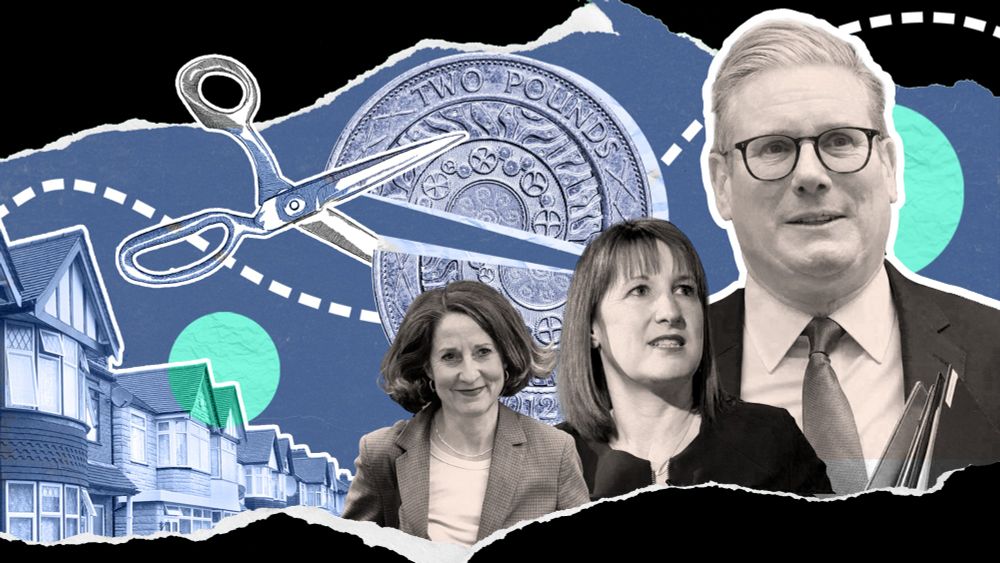Around 4.5 million children are living in relative poverty after housing costs. 200,000 more since before the pandemic.
These are record numbers of children living in poverty.
Latest DWP figures on Households Below Average Income has found 🔽 1/3
27.03.2025 11:33 — 👍 39 🔁 34 💬 1 📌 4

NEW from @jrf-uk.bsky.social.
Much was made of the pressures from a “changing world” on public finances.
Those pressures are also impacting families, and government choices are making it worse.
We find the avg. family will now be £750/yr worse off by 2029, vs today.
Thread.
#SpringStatement
26.03.2025 18:33 — 👍 14 🔁 15 💬 1 📌 0
We know housing is a major cost to many families and make a real difference in how families actually experience changing living standards - which is why unlike the OBR, our JRF measure of living standards includes the impact of housing costs.
New JRF analysis of the Spring Statement coming soon!
26.03.2025 15:20 — 👍 4 🔁 1 💬 0 📌 0
Not only is 'imputed rent' not actually felt as a boost to living standards by most families (because they live in their homes, not rent them out), it's being scored as an increase to living standards without scoring the other important part of the equation - rising housing costs!
26.03.2025 15:20 — 👍 6 🔁 4 💬 1 📌 0

OBR's measure of living standards, RHDI, is up by £500 - largely due to stronger wage growth, including planning reforms which boost incomes.
BUT when you dig into it, 3/4 of the extra income from housing services is 'imputed rents' (what families would receive if they rented out their home).
1/3
26.03.2025 15:20 — 👍 17 🔁 10 💬 1 📌 1
The Chancellor always has choices about how to balance the government books. Given a weak economic outlook and dire forecasts for living standards, particularly for low-income families, it is the wrong choice to balance the books on the backs of disabled people and a squeeze on public services.
24.03.2025 09:07 — 👍 2 🔁 0 💬 1 📌 0

Line graph showing working age families who are not working and claiming benefits have taken a sharp fall already, down 8 percentage points and continue to fall over the rest of the decade.
Working age families who are not working and claiming benefits have already sustained significant losses in incomes, down 8pp, and this continues over the rest of the decade, down a further 4pp.
This is before the cuts to disability benefits, which will make this picture even worse.
24.03.2025 09:07 — 👍 2 🔁 0 💬 1 📌 0

Line graph, showing lone parents have the largest proportionate fall in disposable incomes, down over 10 percentage points since 2019. Couples with children are down nearly 6 percentage points since 2019, closely followed by single people without children.
Families with children continue to struggle, with lone parents and couples with children seeing disposable incomes down 4 percentage points between now and 2030.
Lone parents have been hit particularly hard, forecast to have £1,100 less in disposable income in 2030 compared to now.
24.03.2025 09:07 — 👍 1 🔁 0 💬 1 📌 0

Line graph showing incomes for middle and higher income families track a similar path from 2025, falling through to 2028 before flat lining. Families on the lowest incomes continue to see a sharp fall which began during the cost of living crisis.
Families on the lowest incomes are set to bear the brunt of the pain, with real disposable incomes falling almost twice as fast as middle and higher income families between now and the rest of the decade.
24.03.2025 09:07 — 👍 1 🔁 0 💬 1 📌 0
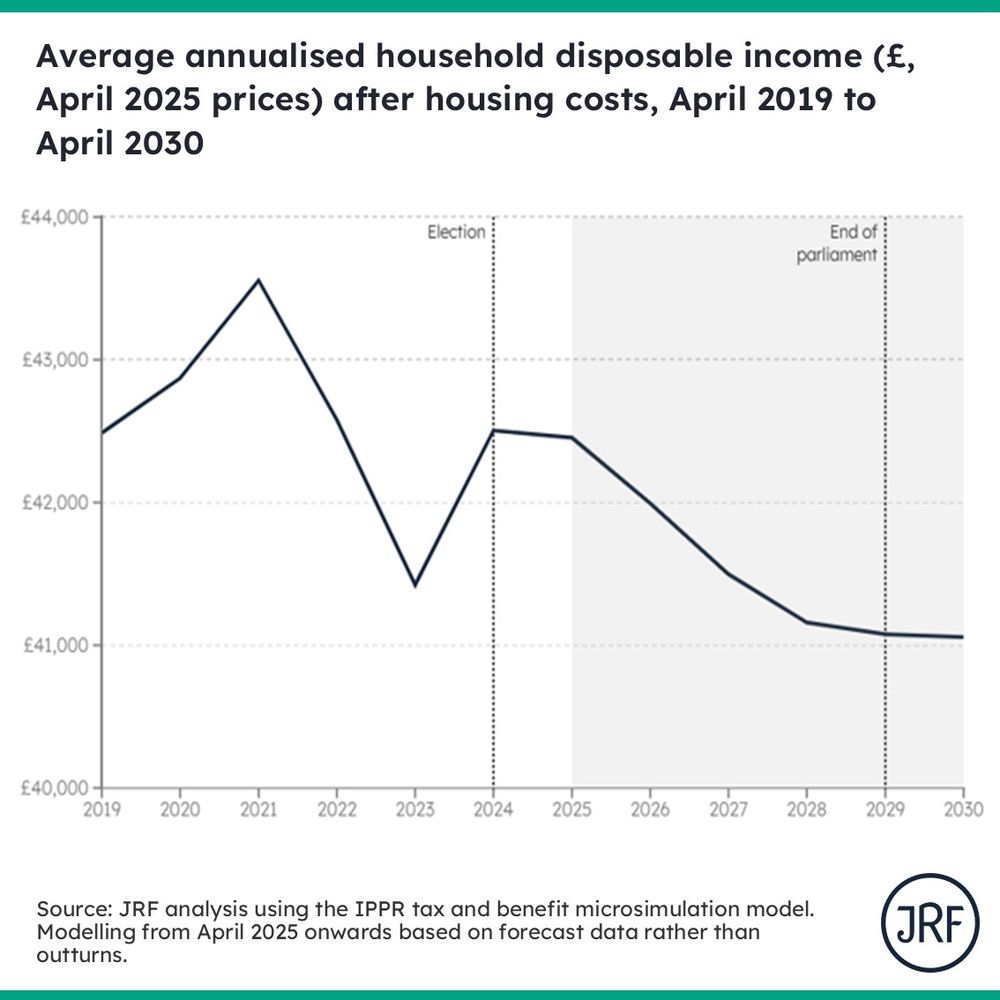
Line graph showing real disposable incomes for the average family feel during the cost of living crisis, before some recovery to 2025. From then, incomes are forecast to fall across the rest of the decade.
Living standards are forecast to have already peaked this parliament, with Keir Starmer on track to preside over the worst parliament in modern history for living standards.
New JRF analysis on living standards ahead of the Spring Statement ⬇️
1/🧵
24.03.2025 09:07 — 👍 8 🔁 5 💬 2 📌 2
New ONS public finances data out this morning look grim for the Chancellor. These are key data for next week’s Spring Statement providing a last chance to look at the fiscal position before we get new forecasts. A thread…
21.03.2025 08:51 — 👍 21 🔁 9 💬 3 📌 3
Further fiscal retrenchment could be extremely harmful given already falling living standards and a weakening economic outlook.
The Chancellor must look to careful reforms of the tax system, not balance the Government books on the backs of those least able to afford it.
21.03.2025 09:34 — 👍 1 🔁 0 💬 0 📌 0
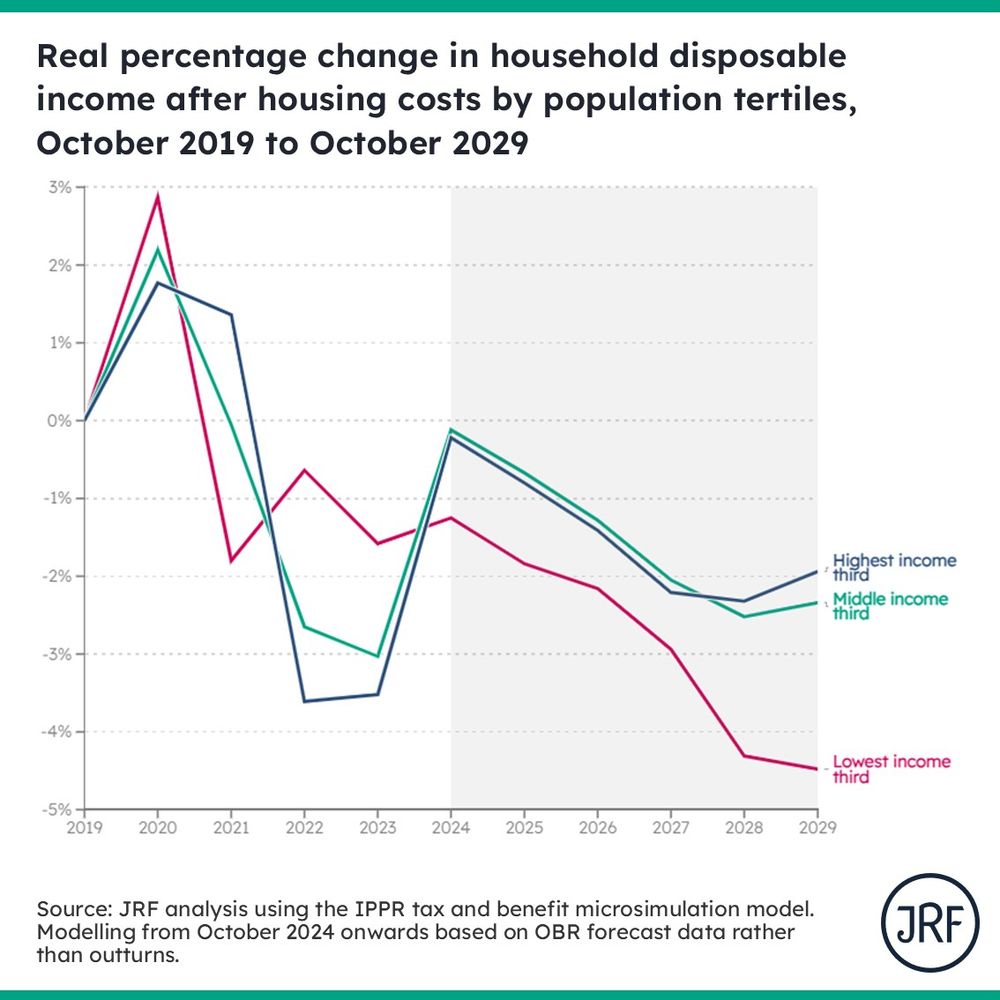
Line graph showing living standards tracking a similar path for highest and middle income families , ending the parliament around 2 percentage points worse off than they were in October 2024. Lowest incomes families however take a much greater hit, down over 3% over the same period
JRF analysis after the Autumn Statement projected falling living standards across the rest of the parliament, with lowest incomes households hit the worst.
Since then, forecasts have deteriorated which will bring more pain for families.
21.03.2025 09:34 — 👍 0 🔁 0 💬 1 📌 0
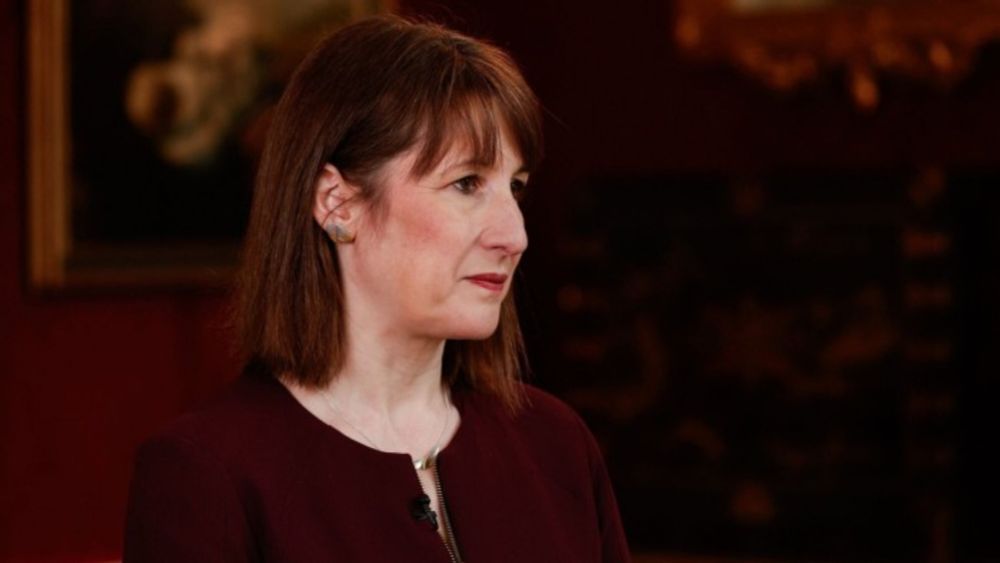
UK government borrowing overshoots expectations
Official figures will add to pressure on chancellor as she prepares for Spring Statement next week
With the Chancellor expected to miss her fiscal rules next week, there are always choices on how to respond.
Cutting disability benefits by £5b and further squeezing public services, already facing £8b in cuts to unprotected departments, are the wrong choices.
1/3
21.03.2025 09:34 — 👍 5 🔁 3 💬 1 📌 0
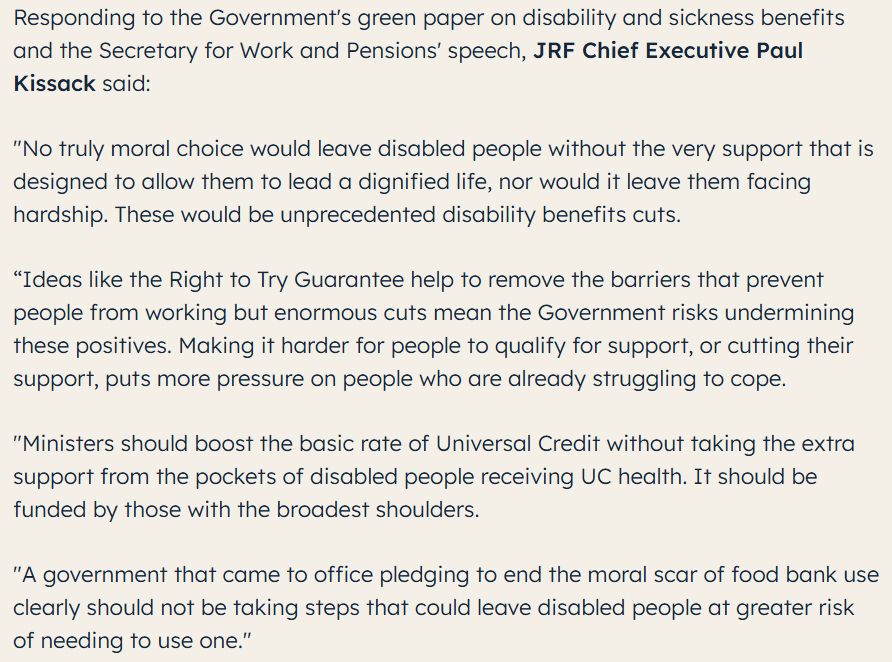
JRF Chief Executive Paul Kissack said:
"No truly moral choice would leave disabled people without the very support that is designed to allow them to lead a dignified life, nor would it leave them facing hardship. These would be unprecedented disability benefits cuts.
“Ideas like the Right to Try Guarantee help to remove the barriers that prevent people from working but enormous cuts mean the Government risks undermining these positives. Making it harder for people to qualify for support, or cutting their support, puts more pressure on people who are already struggling to cope.
"Ministers should boost the basic rate of Universal Credit without taking the extra support from the pockets of disabled people receiving UC health. It should be funded by those with the broadest shoulders.
"A government that came to office pledging to end the moral scar of food bank use clearly should not be taking steps that could leave disabled people at greater risk of needing to use one."
Big picture today is Government chose to cut unprecedented £5bn of income from disabled people at highest risk of hardship. This drive for cost savings undermines any positive changes contained in the disability benefits green paper.
Here are some other big problems:🧵1/11
18.03.2025 22:28 — 👍 183 🔁 82 💬 2 📌 16
The Chancellor always has choices when it comes to balancing the Government's books. Doing so on the backs of disabled people is the wrong choice.
18.03.2025 16:59 — 👍 0 🔁 0 💬 0 📌 0

Families where someone has a learning disability and learning difficulty have incredibly high rates of hardship, with over 8 in 10 going without essentials and 6 in 10 hold a loan taken out for essentials. 7 in 10 families with a person with a learning disability are in arrears.
Low-income families where someone has a learning disability, learning difficulty or mental health condition expected to last more than 12 months are experiencing some of the highest rates of hardship.
Cutting access to PIP will only cause more pain.
18.03.2025 16:59 — 👍 0 🔁 0 💬 1 📌 0

Bar chart showing families with a disabled person, whether in receipt of benefit or not, are at very high risk of hardship. Families without any benefits and those receiving incapacity benefits, like UC LCW and LCWRA have the greatest levels of hardship, with around 9 in 10 going without essentials and two thirds in arrears.
Today's announcement to cut £5b from disability benefits, to plug a funding gap in the Spring Statement, is an immoral choice to balance to books on the backs of those who need it the most.
JRF's cost of living tracker shows the hardship already deeply hitting low-income families, before any cuts
18.03.2025 16:59 — 👍 1 🔁 1 💬 1 📌 1

Child poverty will rise in parts of the UK, warns charity
A leading charity has warned that economic growth alone won't tackle deep-seated levels of poverty.
Really good reporting from
@channel4news.bsky.social on the uk’s shameful rate of child poverty.
We need an ambitious child poverty strategy that starts to rebuild Universal Credit so it protects families when they fall on hard times
www.channel4.com/news/child-p...
29.01.2025 20:50 — 👍 76 🔁 25 💬 1 📌 3

Column chart showing the proportion of people in poverty living in less than good health in 2012/12 compared to 2022/23. The biggest jump in the proportion living in less than good health in people aged between 16-34, but all other age groups also saw an increase except those aged 50-64 which dipped slightly.
The proportion of people who live in poor health is also on the rise, and of real concern is young people.
People aged 16-34 have seen the largest increases in the proportion living in poor health, up 40% compared to levels in 2012/13.
29.01.2025 16:03 — 👍 0 🔁 0 💬 1 📌 0
Life expectancy has also headed in the wrong direction in Scotland, with even greater gaps.
Comparing the most and least deprived areas:
- Females live on average 10.5 years less
- Males live on average 13.2 years less.
29.01.2025 16:03 — 👍 1 🔁 0 💬 1 📌 0
Health chapter in UK Poverty, out today, is a grim read.
Life expectancy in the most deprived areas in England has never been lower, since reporting began in 2011. Comparing the 10% most and least deprived areas in England
- Females live on average 8 years less
- Men live on average 10 years less
29.01.2025 16:03 — 👍 8 🔁 6 💬 1 📌 1
The cost of living crisis has impacted all parts of people’s lives, grinding them down.
Over half of people on the lowest incomes said it had a negative impact on their mental health, and half said they were struggling with their sleep.
29.01.2025 10:01 — 👍 1 🔁 0 💬 1 📌 0
Hardship among some of our key groups of concern remains very high, despite uprating and unfreezing of benefits.
Of families in the bottom 20% of incomes, 9 in 10 receiving housing benefits or Universal Credit went without essentials in October 2024.
29.01.2025 10:01 — 👍 0 🔁 0 💬 1 📌 0

Dual axis column and dot chart, with proportion of families going without essentials and food, and the number in millions. Around 7 in 10 or 4.1m families were going without essentials, including 3m cutting back of skipping meals and 2.3m going hungry.
Key stats from the cost of living chapter of the latest @jrf-uk.bsky.social UK Poverty report, out today 🧵
7 in 10 families in the lowest fifth of incomes were going without essentials in October 2024, including
- Over half cutting back or skipping meals
- 4 in 10 going hungry
1/4
29.01.2025 10:01 — 👍 6 🔁 10 💬 1 📌 0
I ran some stats from our lastest cost of living tracker for Peston's show this week on the experiences of families in receipt of disability benefits.
The whole segment is worth a watch on how many people the Government actually expects to move into work, and the hardship they are facing.
24.01.2025 14:39 — 👍 12 🔁 4 💬 0 📌 0

No end in sight for living standards crisis: JRF’s cost of living tracker, winter 2024
The Government must tackle stagnant levels of hardship as part of their mission for growth, with worse living standards to come if no action is taken.
Despite food inflation easing, and the focus for many shifting away from the cost of living crisis, we find 5.4million low-income families were food insecure in October 2024 – a clear sign the crisis is not over.
More in our latest report here: www.jrf.org.uk/cost-of-livi...
11.12.2024 15:54 — 👍 2 🔁 0 💬 0 📌 1
Lead Analyst, JRF. Previously Wellcome Trust, Citizens Advice, NHF.
#rstats
Views my own, especially about the cricket
I'm the Guardian's deputy political editor in Westminster
Story? Email - jessica.elgot@theguardian.com
https://www.theguardian.com/profile/jessica-elgot
Research Director at the Resolution Foundation. Previous lives at the Bank of England and in the civil service. Focussed mainly on macroeconomics (mainly).
Senior Editor (Politics), New Statesman
Subscribe to my daily briefing Morning Call here: https://morningcall.substack.com/subscribe
Citizen of nowhere - now here in the UK. Academic but without a field (I‘m not a donkey) or a tribe (I‘m not a caveman). Also metal head! 💀🤘🏻
Social policy researcher (though sometimes pretends to be a philosopher), Prof co-leading WelfareExperiences project and kcl.ac.uk/csmh work & welfare strand. Was at @BenBaumberg at the other place.
Associate Director for Scotland, Wales and Northern Ireland at the Joseph Rowntree Foundation.
Senior Policy Adviser at the Joseph Rowntree Foundation. Care, work and poverty. Also York. Views here my own.
Senior Policy Adviser at the Joseph Rowntree Foundation
@jrf-uk.bsky.social https://www.jrf.org.uk/
Economist and occasional politics dabbler. Working on a project to improve labour markets. Associate fellow, Centre for European Reform. Visiting fellow, Institute for Policy Research, Bath University.
FT columnist, writing about work, technology & economics.
Senior Policy Adviser at the Joseph Rowntree Foundation, working on economic security, hardship, employment, job quality. Views my own.
Analyst at Joseph Rowntree Foundation. Sociology PhD Univ. Stirling (2019-2024). Interested in ethnic penalties, labour market impacts, refugee integration, social stratification, and lgbtqia+ research.
Waitress turned Congresswoman for the Bronx and Queens. Grassroots elected, small-dollar supported. A better world is possible.
ocasiocortez.com
Professor of Social & Public Policy at University of Glasgow
Perimenopausal | neurodivergent | navigating parenting kids with SEND
Work at the Trades Union Congress - Policy Officer on Labour market & Social security. Leicester City fan. Tweeting in personal capacity retweets not endorsements
Policy & Research @resolvepoverty. Formerly @uclspp. Usual disclaimers apply.
🔗 https://www.resolvepoverty.org/
Lead analyst for Scotland at the Joseph Rowntree Foundation @jrf-uk.bsky.social
Background in understanding social inequalities in education, now focused on poverty and inequality.


